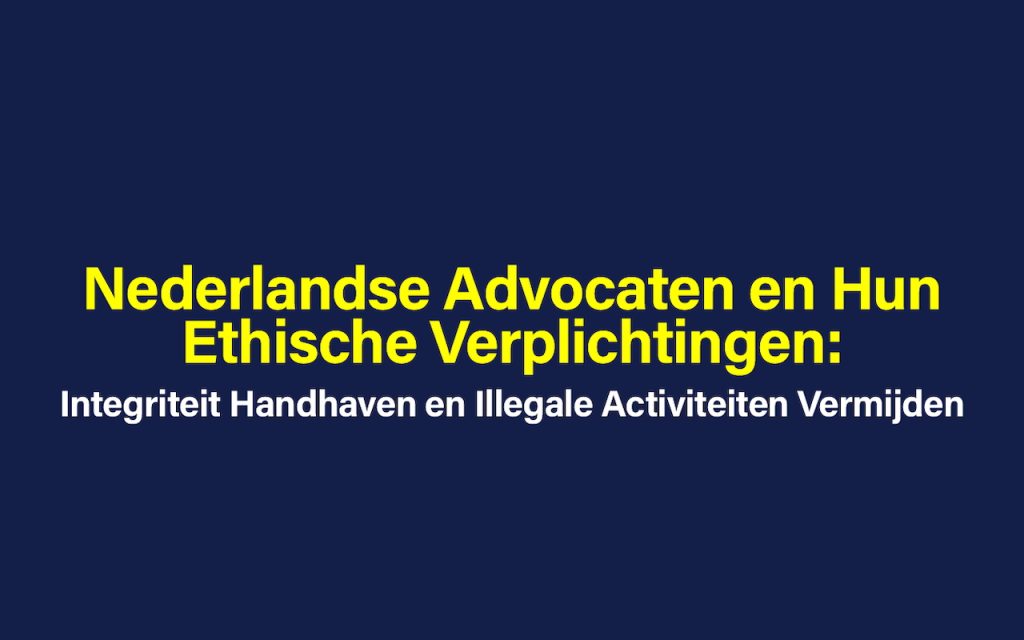
A lawyer's role in Dutch society goes beyond providing legal assistance. Lawyers play a crucial role in ensuring justice, fair trials and maintaining public trust in the legal system. Upon admission to the bar, Dutch lawyers take an oath, committing themselves to independence, integrity and ethical behavior. Any deviation from these principles, such as involvement in illegal activities, can lead to serious consequences.
The Oath and The Ethical Framework.
The basis of a Dutch lawyer's professional obligations is laid down in the Lawyers Act. This law, along with the 2018 Rules of Conduct of the Dutch Bar Association (Dutch Bar Association), provides a comprehensive framework for maintaining high standards of professionalism and ethics.
The oath taken by lawyers is a solemn promise to respect the rule of law, to act in the best interests of their clients and to adhere to the ethical guidelines of the profession. The Rules of Conduct explicitly state that lawyers must conduct themselves in a manner appropriate to their role. Rule 1 of the Rules of Conduct states:
"Given his special position in the legal system, the lawyer is bound by a duty of respectable professional practice. This duty applies to his client, the other parties involved in the administration of justice and his profession, and is based on the interest in the proper administration of justice."
The Prohibition of Illegal Activities
The expectation that lawyers act as role models is not just an aspiration. Dutch lawyers are legally and ethically prohibited from engaging in any form of illegal activity, including crimes such as libel and slander.
Under Article 261 of the Penal Code, libel is defined as intentionally harming a person's honor or good name by publicizing specific allegations. Slander (Article 262) goes one step further and involves defamation with the knowledge that the allegations are false. Both crimes can lead to criminal prosecution:
Article 261 Penal Code:
- He who intentionally defames someone's honor or good name by counting a certain fact, with the apparent purpose of publicizing it, shall be punished, as guilty of defamation, with imprisonment of not more than six months or a fine of the third category.
- If this is done by means of writings or images, which have been distributed, publicly exhibited or shown, he shall be punished by imprisonment for not more than one year or a fine of the third category.
Article 262 Penal Code:
He who is guilty of defamation or libel, when he knows or should reasonably suspect that the fact, which he charges, is contrary to the truth, shall be punished with imprisonment of not more than two years or a fine of the fourth category.
Application in the Aruban Legal System
These principles also apply within the Aruban legal system. In Aruba, the conduct of attorneys is regulated by the Lawyers' Regulation. This regulation requires lawyers to take an oath or make a pledge in a public session of the Court when registering with the Common Court of Justice. This oath emphasizes their obligation to act lawfully and ethically.
Aruba's Penal Code also addresses offenses such as libel and slander. Although the articles may be numbered differently than in the Netherlands, the core of the regulations remain consistent. Involvement in libel or slander is considered a criminal offense that can result in legal penalties.
In addition, Aruba has a disciplinary system to address abuses within the legal profession. The Supervisory Board and the Board of Appeals play a crucial role in this, and possible sanctions include warnings, suspensions and delisting.
Consequences of Misconduct
Lawyers who violate their ethical obligations or engage in criminal conduct face both legal and professional consequences. The Dutch Bar Association has a disciplinary system in place to deal with such violations. Possible sanctions include warnings, fines, suspension of professional practice and even removal from the register. These measures emphasize the seriousness with which the profession views misconduct, and underscore the need for lawyers to ensure integrity.
Broad Implications
The prohibition against illegal activities, including libel and slander, serves a dual function. It protects individuals and institutions from harm, while safeguarding the reputation of the legal profession. Trust in the legal system is vital to social stability, and lawyers, as public servants of justice, have a unique responsibility to maintain this trust.
Conclusion
Dutch and Aruban lawyers are bound by their oath and the ethical standards of their profession to conduct themselves with the highest integrity. The prohibition against involvement in illegal activities, such as libel and slander, is not only a legal requirement but also a moral duty. By adhering to these principles, lawyers ensure the proper administration of justice and maintain public confidence in the legal system. For any lawyer to deviate from this path is not only a violation of the law, but also a betrayal of the principles they have sworn to uphold.

